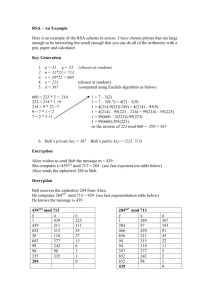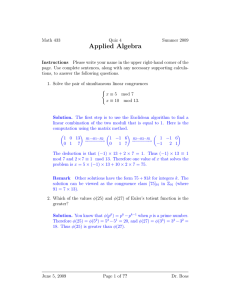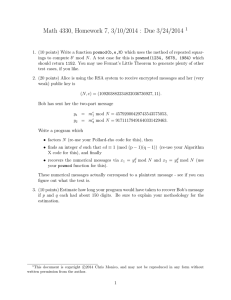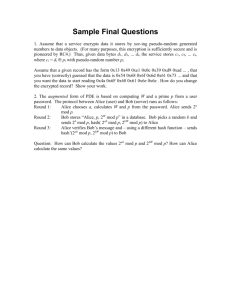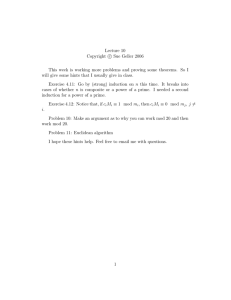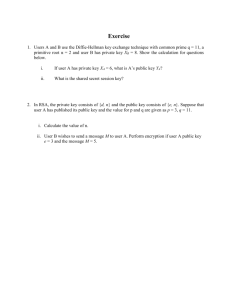MATH 470.200/501 NAME Examination 2 SIGNATURE
advertisement
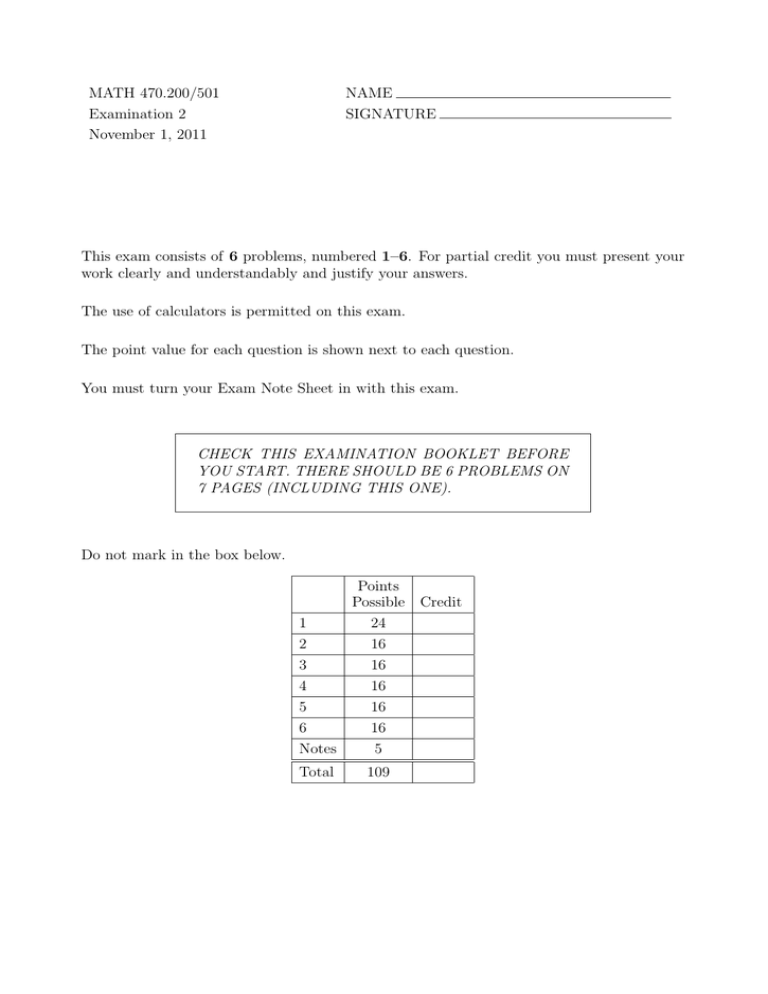
MATH 470.200/501 Examination 2 November 1, 2011 NAME SIGNATURE This exam consists of 6 problems, numbered 1–6. For partial credit you must present your work clearly and understandably and justify your answers. The use of calculators is permitted on this exam. The point value for each question is shown next to each question. You must turn your Exam Note Sheet in with this exam. CHECK THIS EXAMINATION BOOKLET BEFORE YOU START. THERE SHOULD BE 6 PROBLEMS ON 7 PAGES (INCLUDING THIS ONE). Do not mark in the box below. Points Possible Credit 1 24 2 16 3 16 4 16 5 16 6 16 Notes 5 Total 109 NAME 1. MATH 470 Examination 2 Page 2 [24 points] Alice and Bob are using RSA to communicate. (a) Alice’s encryption key is (n1 , e1 ) = (187, 7). Alice wants to encode the plaintext ‘10’ to send to Bob. What is the ciphertext that she sends? (b) On another occasion, you intercept the ciphertext ‘5’ sent to Alice. Find Alice’s decryption key and write down the expression that yields the plaintext. (You do not need to calculate the plaintext completely.) (c) Suppose that Bob’s encryption key is (n2 , e2 ) = (989, 12), and suppose that we have discovered that φ(989) = 924. Use this information to factor 989. November 1, 2011 NAME 2. MATH 470 Examination 2 Page 3 [16 points] The following congruences hold: 789495 ≡ 8154 (mod 15841) 7891980 ≡ 218 (mod 15841) 7897920 ≡ 1 (mod 15841) 789990 ≡ 3039 (mod 15841) 7893960 ≡ 1 (mod 15841) 78915840 ≡ 1 (mod 15841) (1) (2) (3) 1231625 ≡ 4852 (mod 13001) 1236500 ≡ 13000 (mod 13001) 1233250 ≡ 10094 (mod 13001) 12313000 ≡ 1 (mod 13001) (4) (5) (a) Using the data in lines (1)–(3) above, apply the Miller-Rabin Primality Test to n = 15841. What can you conclude about 15841? Explain. (b) Using the data in lines (4)–(5) above, apply the Miller-Rabin Primality Test to n = 13001. What can you conclude about 13001? Explain. November 1, 2011 NAME 3. MATH 470 Examination 2 Page 4 [16 points] Suppose that n = 1643 is being used for RSA encryption, and suppose that we have discovered that the encryption exponent is e = 29 and that the decryption exponent is d = 269. Suppose further that the following congruences hold: 2975 ≡ 1613 (mod 1643) 5975 ≡ 931 (mod 1643) 3975 ≡ 712 (mod 1643) 6975 ≡ 1642 (mod 1643). Use the Universal Exponent Factorization Method to factor 1643. Show your work. November 1, 2011 NAME 4. MATH 470 Examination 2 Page 5 [16 points] Let n = 7991. We know that 7991 is the product of two distinct primes. Suppose in carrying out the quadratic sieve that you have found that 752 − n = −2366, 842 − n = −935, 1012 − n = 2210, 792 − n = −1750, 942 − n = 845, 1032 − n = 2618. Use this information to factor 7991. Show your work. November 1, 2011 NAME 5. MATH 470 Examination 2 Page 6 [16 points; (a) 6 points, (b) 10 points] Throughout this problem we work modulo p = 19, with chosen primitive root α = 3. (a) Show that L3 (5) = 4. (b) Use the Pohlig-Hellman algorithm to find L3 (2). November 1, 2011 NAME 6. MATH 470 Examination 2 Page 7 [16 points; (a) 6 points; (b) 10 points] Alice and Bob are again using RSA to communicate. They are using the same modulus n, so that Alice’s public encryption key is (n, eA ) and Bob’s is (n, eB ). Alice and Bob happen to have chosen eA and eB that are relatively prime. Now Charles wants to send the message m to both Alice and Bob. You may assume that m < n. (a) What does Charles send to Alice? What does he send to Bob? (b) Suppose that Eve intercepts both of these transmissions. Show how Eve can recover m without factoring n. November 1, 2011

